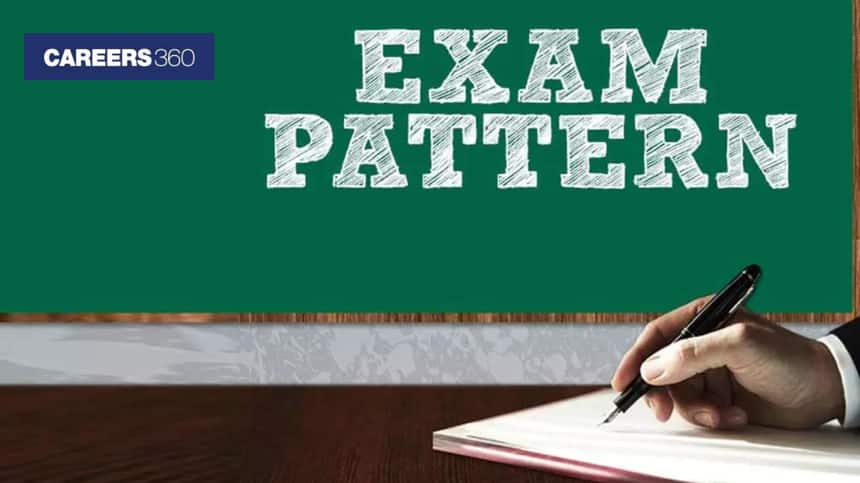TS EAMCET Exam Pattern 2026 - Marking Scheme, Exam Duration
TS EAPCET Exam Pattern 2026 : JNTU Hyderabad will soon publish the TS EAPCET 2026 exam pattern on the website, eapcet.tsche.ac.in. The TS EAPCET pattern includes the marking scheme, mode of exam, types of questions, exam duration, total marks and more. Candidates must be aware of the exam pattern to prepare effectively for the TS EAPCET exam. Along with the exam pattern, candidates must also be aware of the TS EAPCET syllabus 2026 to know the important topics for exam preparation. The TS EAMCET 2026 registration will begin on February 19, 2026. The authority will conduct the TS EAMCET 2026 exam on May 4 and 5 (A&P) and between May 9 to 11 (Engineering). The duration of the TS EAPCET 2026 exam is three hours. The exam will be conducted for a total of 160 marks. Read the complete article to know more about the TS EAPCET total marks for BiPC, the marking scheme, and more.
This Story also Contains
- TS EAPCET Exam Pattern 2026
- TS EAMCET Marking Scheme 2026
- TS EAPCET Syllabus 2026

TS EAPCET Exam Pattern 2026
Students must follow the TS EAMCET exam pattern 2026 and syllabus to plan their preparation. The TS EAPCET question paper consists of a total of 160 questions. The questions are based on physics, chemistry, and mathematics. Moreover, as per the exam pattern, there is no TS EAPCET negative marking. The official TS EAMCET paper pattern is as follows:
TS EAMCET 2026 Exam Pattern
Particulars | Details |
|---|---|
Examination Mode | Computer-Based Exam (Online) |
TS EAMCET exam time duration | 3 Hours (180 minutes) |
Medium of Exam | English, Telugu, and Urdu |
Sections |
|
Total Number of Questions | 160 Questions |
Type of Questions | Multiple Choice Questions (Objective) |
TS EAMCET Total Marks | 160 |
Marking Scheme | For every correct answer, 1 mark will be given |
TS EAMCET Negative Marking | There is no negative marking. |
Also Read:
TS EAMCET Marking Scheme 2026
For each correct answer, candidates will be awarded one mark. Take a look at the marking scheme of TS EAMCET 2026 below.
| Subject | Number of Questions | Marks per Question | Marks |
|---|---|---|---|
| Physics | 40 | 1 | 40 |
| Chemistry | 40 | 1 | 40 |
| Mathematics | 80 | 1 | 80 |
| TS EAPCET Total Marks | 160 | ||
TS EAPCET Syllabus 2026
JNTUH will release the TS EAPCET 2026 syllabus on the official website, eapcet.tgche.ac.in. The syllabus of TS EAPCET 2026 consists of class 11 and 12 topics of physics, chemistry, and mathematics subjects. Students can download the official syllabus of TS EAMCET 2026 and study for the exam accordingly. As the TS EAPCET syllabus is vast, candidates are advised to make a strategic timetable for the preparation for the exam.
Frequently Asked Questions (FAQs)
The TS EAPCET 2026 exam for Engineering will be conducted from May 9 to 11, 2026, while the Agriculture and Pharmacy exams is scheduled for May 4 & 5, 2026.
JNTU conducts the TS EAPCET 2026 exam as a computer-based test.
The authorities conduct TS EAMCET 2026 in English, Telugu and Urdu.
JNTU Hyderabad will release the TG EAPCET exam pattern 2026 along with the information brochure on the official website.
TS EAMCET exam 2026 will be conducted for 3 hours.
No, there is no negative marking in TS EAMCET exam.
There are a total of 160 questions in the TS EAPCET 2026 exam.
Popular Courses and Specializations
List of colleges accepting TS EAMCET
Browse Engineering Colleges by State
Questions related to TS EAMCET
On Question asked by student community
Hello,
You can get the TS EAMCET Chapter-Wise Weightage details from the Careers360 website. This webste also provides previous year exam papers, exam pattern, marking schemes, question papers along with answer keys, important dates, exam paper analysis, preparation tips and many more.
LINK: https://engineering.careers360.com/articles/ts-eamcet-chapter-wise-weightage
Hello,
With a TS EAMCET rank of 32,000 , getting a seat in a government BSc Nursing college in Telangana is not guaranteed . Based on previous year trends:
-
Your rank is above the minimum qualifying rank , so you are eligible.
-
Admission to government colleges usually fills with students
Hello dear candidate,
Yes, you have a very good chance of getting a BPT seat with 488 out of 600 and TS EAMCET rank of 14,000 under the ST category.
As the cut off of BPT for ST category students are generally between 25,000 to 45,000 ranks, depending upon the
Hi dear candidate,
The TS EAMCET answer sheet and response sheet are officially out and you access both of them for reference with the links attached below:
TS EAMCET Answer Key 2025 (Out) - Download Link, Raise Objections
TS EAMCET Response Sheet 2025 (Out) - Download Link
BEST REGARDS
Hello,
Yes, with rank of 43000. in EAMCET you have a moderate chance of getting a b pharm seat in private colleges but chances in top colleges are low because the cutoff usually closes around 25,000–30,000 ranks, so admission in top colleges may be difficult
However, you can still get
